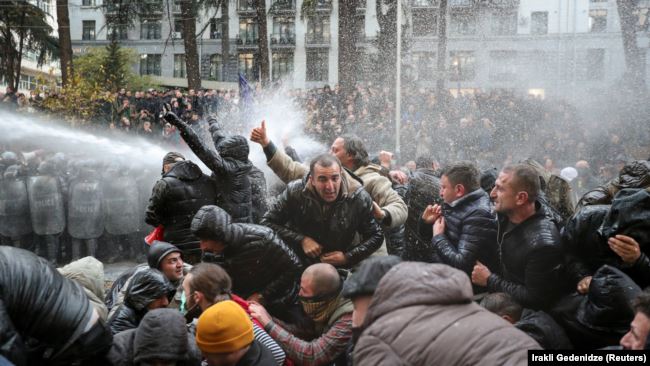“More working hours, more live coverage, tiredness, lots of people, lots of correspondents, noise, sometimes even a little bit of fear,” these things come to the mind of Nino Tarkhnishvili, journalist from Georgian service of Radio Liberty, when she hears the word “protest.”
Georgia. November 16. The third day of the protest outside the Georgian Parliament. Thousands accused Bidzina Ivanishvili, the leader of Georgian Dream party, of failing to amend the electoral reform system during the voting on November 14.
Journalists were working day and night to keep people informed. During the protest one could see journalist putting make up, the other one writing articles in laptop placed on the lap, another one eating cheese with bread without putting aside the microphone. Nino Tarkhnishvili from Radio Liberty and Etuna Bagrationi from TV Pirveli were among the journalists working there.
Bagrationi told Cignal that it was difficult for journalists to work during protests as they must try to be concentrated, independent and do right things for people watching TVs. “It is really very hard to work all day and all night,” she added.
Tarkhnishvili added despite the difficulties it was a good experience for journalists, especially the young ones, to visit protest actions, as they could see lots of different people and hear different opinions.
“Sometimes you need to go out from your office just to see what is going on, what people think and want. Sometimes it is boring sitting in the offices, and from this perspective protests are good,” Tarkhnishvili noted.
Regarding to the competition between journalists, Bagrationi mentioned that the only situation when journalists might be competitive was the “battle” of microphones, because they should hold it so that it could be seen from TV.
“You have to be very competent, because you hear different opinions, and you have to choose what is the appropriate one. You have to manage to be smart and fast, because there are lots of journalists here, and there is a somehow competition between journalists,” Tarkhnishvili said.
On November 18 police used water cannons to disperse the protesters blocking the entrance of the Parliament. 18 people were detained, the Interior Ministry announced.

“When there is a clash between Police and the protesters first I try to protect me and camera from damage, because it is very hard to work in a situation where someone can hit you. But at the same time you should also tell people what is going on,” Bagrationi mentioned.
Tarknishvili said that from the office editors advised them not to be in the middle of clashes.
“It is dangerous, but when you work, you don’t think about danger, you want to be closer to the action. If you are a dead journalist, you can’t bring good news to your media outlet, so journalist should be alive,” she added.
During this rally the weather also created some barriers as it was cold, that is why Tarknishvili emphasized the importance of wearing warm clothes and comfortable shoes in such kind of weather as journalists could stand there for 6 hours.